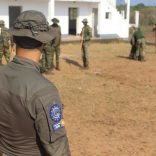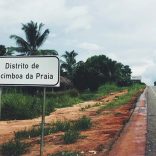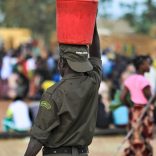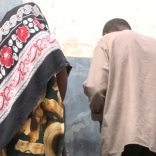Mozambique: Train-the-Trainers Programme puts in practice counter-terrorism operations
Mozambique: Push for mercenaries and intervention in Cabo Delgado – By Joseph Hanlon

File photo: DW
Comment Are the drums of war silencing any hope of peace?
The failure to resolve the growing Cabo Delgado civil war is now attracting a wide range of actors hoping to profit. And many come with neo-colonial, racist and anti-Islam agendas, or trying to use Mozambique as a pawn in global chess games.
As we report below, France, the United States, South Africa and many private military companies are already involved or want to join in. A few Mozambicans and others profit from the war, or profit from Cabo Delgado’s resources. Local people gained little from those resources. Lacking hope or prospects, some young people began attacking the symbols of that wealth and of a state seen to be protecting the rich and not the poor. Already the outsiders have piled in. Private security companies protect the gas installations, mercenaries back the government, and Islamist militants back the insurgents – turning this into a war in which wealthy individuals and institutions are protected, and the poor suffer even more.
There are 250,000 displaced people and an estimated 700,000 affected and in need of help. “The world still has no idea what is happening, because of indifference, and because it seems that we have already become accustomed to wars. There is war in Iraq, there is war in Syria and there is also now a war in Mozambique,” Pemba Bishop Luiz Fernando Lisboa said last week.
Increasing amounts of money are being spent militarising this war and succouring the affected. If five years ago even part of this money had been shared with the poor and marginalised of Cabo Delgado, the war would never have started. Is the point of no return being passed, where the only response is stepping up the military action, creating hopelessness and insurgent recruits on the ground, and propelling a war that will run for a decade? Or is there still a chance to show the young people of Cabo Delgado that they can share in the province’s wealth and resources, and have a future? Joseph Hanlon
Mercenaries to the fore as Dyck contract extended
Dyck Advisory Group (DAG) mercenaries have had their three-month contract extended and expanded. They started as a shoe-string operation with just 30 men entirely operating from the air, with three helicopters with machine guns, two fixed wing aircraft, and two microlight armed spotter planes. The new contract apparently includes training and perhaps supply of ground troops, expansion of the air operation, and a new forward base based on improving the Macomia airstrip. (Zitamar 16, 20 July; Savana 24 July)
“The Mozambique Defence Forces are unprepared and under-resourced and we have to move fast. Some of the atrocities committed are unlike anything I have seen before and I’ve seen a lot of wars, in a lot of different places,” DAG head Lional Dyck told Hannes Wessels who runs a website Africa Unauthorized (17 July). Both fought for the Rhodesian army before independence there. Dyke continued, “Despite this barbarism, this enemy is organised, motivated and well equipped. If we don’t get on top of this, it’s going to spread south fast and that will be a catastrophe for the entire region.”
Wessels commented: “At this point it looks like a semi-retired 76 year old veteran of many wars, in the twilight of his years, stands pretty much alone in the ongoing struggle to stem the spread of Islamic fundamentalism and to stop the slaughter of blacks by blacks on the killing fields of Africa.” https://africaunauthorised.com/?p=3383
In the Telegraph (London, 9 June), Rhodesian and Zimbabwean journalist Peta Tornycroft wrote an article headlined “Band of Angolan civil war veterans led by retired Rhodesian army colonel hailed for ‘saving the day’.” She writes that “the desperate Mozambican government” recruited Dyck. “As hundreds of militants advanced on [Pemba], Col. Dyck’s helicopters flew in and started shooting at the attackers. Insiders say they ‘shot the shit’ out of the fighters, killing dozens.”
This is part of a growing chant that white men who fought for apartheid South Africa and UDI Rhodesia are now coming to the rescue of the people they fought against (and lost to) 30-40 years ago.
Changing sides: At Zimbabwe independence Lionel Dyck stayed and joined the new joint army. He rose to be commander of Zimbabwe paratroops which took part in 1981-3 in actions against dissident Zanla troops, some of who had been organised without their knowledge by agents of apartheid South Africa to fight against the new government. In 1985 he was a commander of Zimbabwean troops fighting Renamo in Mozambique, and commanded the troops that took Renamo’s Casa Banana base on the Gorongosa mountain. Savana Friday (24 July) has a photo of Dyck with Samora Machel and Marcelino Dos Santos at Casa Banana in 1985. This gave Dyck high level contacts in Frelimo as well as with Emerson Mnangagwa, now president of Zimbabwe but then Minister of State Security and head of the Central Intelligence Organisation. Dyck moved on to demining and in 2013 DAG was contracted for Mozambique anti-poaching operations. With the failure of Russian Wagner mercenaries in Cabo Delgado, DAG was brought in by Police Chief Bernardino Rafael.
It is reported that Dyck plans to use the “fireforce” tactic developed in the late 1970s by the Rhodesian army when Dyck was a member. The tactic involves a small attack aircraft accompanied by several small helicopters with groups of just four men who land and try to surround an insurgent group to prevent it escaping while it is attacked from the air.
DAG is violating South Africa’s Foreign Military Assistance Act which requires all paramilitary activity, including that conducted outside of South Africa, to obtain prior approval from the South African Government. Africa Intelligence (22 July) reports that to avoid scrutiny, Dyck has used his anti-poaching operations and connections to create a logistics base with a landing strip in the Limpopo National Park, adjacent to South Africa’s Kruger National Park, and he used this at least to import helicopters to Mozambique which are now being used in Cabo Delgado. Mozambique and South Africa are not signatories to the Convention for the Elimination of Mercenarism in Africa.
US and French look to move in
Both the United States and France are trying to become involved in patrolling the coast of Cabo Delgado. The US is explicitly linking anti-drug and anti-insurgency activity.
“There’s a lot of overlap between the drug traffickers and extremists and the types of conditions that enable them to thrive, and sadly, those conditions are present in Mozambique. So in Mozambique [the State Department is] supporting some of the Mozambican government’s counter-narcotics efforts. We’re also working … to help them disrupt some of the transnational organized crime at sea through more effective patrolling,” said Heather Merritt, Deputy Assistant Secretary of State for the Bureau of International Narcotics and Law Enforcement Affairs, in a 21 July press briefing. https://www.state.gov/telephonic-press-briefing-on-drug-trafficking-in-africa/
Merritt stressed that across Africa crime syndicates often “engage in multiple crime areas, and those networks may traffic in wildlife, drugs, people”. She noted that “narcotics trafficking may be indirectly funding some of the terrorist networks and activities, as traffickers pay for safe passage via under-governed spaces and through routes that have been exploited as well by terrorist entities.”
“We’re definitely concerned about Mozambique, and … drug traffickers and violent extremists have both utilized the ungoverned space”, Merritt continued. And then she hinted at military and navy involvement, linking terrorism and heroin: there is “limited patrolling and limited law enforcement reach there. … We are as a US government concerned about the extremism in Cabo Delgado … We recognize that it’s a security threat that has a nexus to criminality, to terrorism, and to looking at sort of governance capacity, law enforcement capacity, and military capacity within Mozambique.”
At least one US private security company is already recruiting Portuguese speaking US nationals to “provide strategic and tactical advisory support services” to the Mozambique government.
Meanwhile, French sources confirmed to Lusa (17 July) that Mozambique and France are discussing a military maritime cooperation agreement in the context of possible support in the fight against insurgents in Cabo Delgado. The French Armed Forces of the Southern Zone of the Indian Ocean (FAZSOI) have been promoting military cooperation, “conducting training with the Mozambican authorities on state action at sea”, the source said.
The island of Mayotte is just 500 km east of Pemba and is officially part of mainland France (and thus the EU). It has an important French military base. In addition France has several Islands in the Mozambique Channel between Mozambique and Madagascar, shown on this map: https://bit.ly/Ilands-Fr
Equally important, the French company Total recently bought control of area 1 of the Cabo Delgado gas field. Total brought in former French foreign legion officer Frederic Marbot to manage security for its gas project on the Afungi peninsula in Palma (Africa Intelligence, 1 June; Cabo Ligado 9 June). Marbot, who reportedly also ran security at Total facilities in Nigeria and Kazakhstan, will be joined in Cabo Delgado by his former foreign legion colleague Charles Stroeng. It appears that he is setting up a security unit partly composed of Mozambican troops already deployed to protect the Afungi camp.
Total already has contracts with five private security companies. Three are British: Blue Mountain, Control Risks and G4S, The other two are Arkhe (owned by Omega, South Africa/Mauritius) and GardaWorld (Canada), Arkhe, one of the biggest suppliers of security guards in Mozambique, including to embassies, was cited in the legal actions against Gemfields for atrocities at its Cabo Delgado ruby mine.
Push for South African intervention
“Staying out of Mozambique could see the insurgency there continuing to grow,” warns the South African Institute of Strategic Studies (ISS) in an article by Peter Fabricius in ISS Today (23 July).
Islamic State has sleeper cells in South Africa and has recruited South Africans into its ranks. Some of these extremists fought with the group in Syria, some are involved in Cabo Delgado, and others are lying low in various cities in the country, according to Martin Ewi, ISS regional observatory coordinator.
Fabricius writes that “security sources have revealed that two accomplices of Islamic State suspects in South Africa were identified by South African officials in a photograph which the Cabo Delgado insurgents recently posted. The two are linked to legal cases underway in South Africa. That being so, it does not seem far-fetched to worry that these or other Mozambique insurgents might cross into or return to South Africa with hostile intent.”
The articles comes after State Security Minister Ayanda Dlodlo said “we are taking very, very seriously” Islamic State’s 3 July warning to South Africa not to get involved in Cabo Delgado. (News24 19 July; this newsletter 494 9 July). Dlodlo said South Africa could not extricate itself from conflict in the southern African region. “As a result of that, it becomes a responsibility for all of us in SADC to assist Mozambique in whatever way we can,” she added.
The appointment of Robert McBride on 17 July to head the State Security Agency’s (SSA) foreign branch, Dlodlo added, would assist in South Africa’s efforts to deal with these threats. The job is effectively coordinator of foreign intelligence. McBride and Dlodlo were both Umkhonto weSizwe guerrillas.
$14.9 bn loan go-ahead for Total LNG
$14.9 bn in debt finance for Cabo Delgado gas was signed on 17 July. It includes the development of the Golfinho and Atum natural gas fields located in Offshore Area 1 and the construction of a two-train liquefaction plant with a total capacity of 13.1 million tons per annum (MTPA). LNG production could start in 2024.
Standard Bank calls it “the largest project financing deal” in Africa. It includes direct and covered loans from 8 Export Credit Agencies (ECAs) from US, Japan, UK, Italy, South Africa, Netherlands and Thailand;19 commercial bank facilities; and a loan from the African Development Bank.
The French company Total (with 26.5% which it recently bought, indirectly, from Anadarko) is the operating company. Other owners are Mitsui (20%), ENH (Mozambique government, 15%), three Indian state-owned companies (30%), and the Thailand state company PTTEP (8.5%)
In Area 4, deep-water offshore, there are two LNG projects. The $10 bn Coral South floating LNG project led by ENI will produce 3.4 MTPA, entirely sold to BP, and could begin by 2022. The second $25 bn project is led by ExxonMobil which has postponed indefinitely its final investment decision (FID), in part due to the dramatic fall in LND demand and prices.
By Joseph Hanlon












Leave a Reply
Be the First to Comment!
You must be logged in to post a comment.
You must be logged in to post a comment.